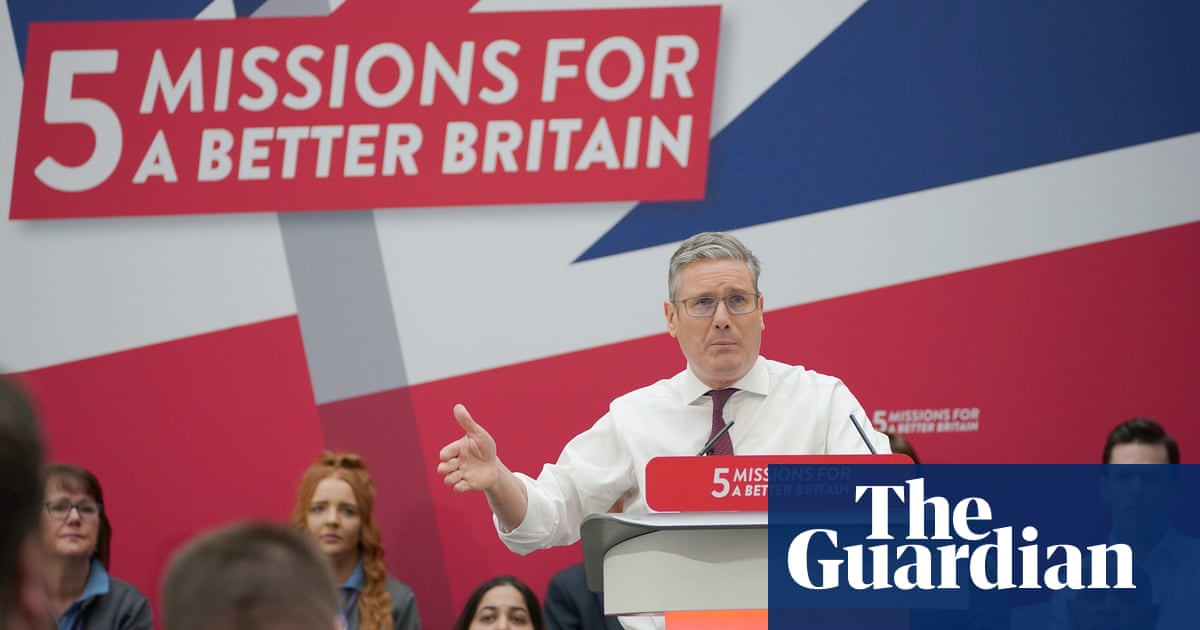
For Labour opposition leaders, knowing that success is a possibility can be the trickiest stage of all. Tony Blair, in the final months before he won power, was famously described as like a man carrying a priceless vase across a slippery floor. For a party that loses more general elections than it wins, and yet is often ahead in the polls, holding a brittle supremacy over the Tories is a familiar feeling.
In one sense, Keir Starmer is carrying a smaller vase than Blair was. Few expect him to win by a landslide. And yet the floor he needs to cross is wider: the next election might not be for two years. Even Labour becoming the largest party in a hung parliament, and thus Starmer the probable head of a coalition government, would be quite an achievement given the current Conservative majority and the onslaught from them and their press allies that is likely to come.
Starmer heads to next week’s Labour conference after enjoying the largest and most consistent poll lead over the Tories of his tenure. He has marginalised, or sacked, his leftwing critics in the shadow cabinet, parliamentary party and Labour bureaucracy. Meanwhile, the accelerating deterioration of our public services and standard of living, and the Conservatives’ growing extremism, recklessness and internal divisions, make the case for a change of government on an almost daily basis.
And yet, envisaging a Starmer premiership remains very much a minority occupation. What such a government would do is still pretty abstract. Starmer has not announced many policies, mainly on the basis that his predecessor, Jeremy Corbyn – now almost a non-person in official Labour circles – had far too many. Those policies Starmer has announced, for example on extending employee rights and reshaping the economy in response to the climate crisis, have sometimes been substantial in their implications for our unequal, fossil fuel-driven country. But so far they have not resonated.
His public persona has been partly to blame. Careful, reined-in, plainly spoken, he has not made many people excited to find out what a premiership of his would be like – unlike Blair, who as opposition leader intrigued even the radical left, longstanding Tory voters and rightwing journalists. In an age of shortening attention spans and almost constant political novelties, such as Liz Truss’s sugar-rush tax proposals, Starmer’s patience and steadiness may not be the great assets that he and his advisers imagine. In government, these qualities would be a very welcome change, but in opposition they leave many voters disengaged.
Yet Labour has a bigger problem than Starmer’s limitations and strategies. Replacing him with another leader – as some party figures to his right as well as his left would like – would soon make this clear. The problem is a British habit that has become particularly entrenched since the 1980s, when Margaret Thatcher reintroduced us to the experience of extended Tory rule.
These seemingly endless ascendancies have all included periods when the big, over-confident promises of modern Toryism have clearly failed – as Truss’s promises probably will, too. During these periods, many centrist and even rightwing voters like to have a look at Labour’s alternatives. But this interest is often largely performative: a display of disenchantment with the government and supposed open-mindedness, rather than a real change of heart. After a year or two, at most, as the next general election approaches, these left-curious voters usually drift back to their relationship with the Conservatives, as polls repeatedly show.
The reason often given by these voters, and by the many commentators and analysts who follow their behaviour, is that Labour’s leader is “not prime ministerial enough”. Tellingly, this broad criticism is never applied to underqualified Tory leaders, such as the lazy, disorganised Boris Johnson, or the wooden and dogmatic Truss.
A brief flirtation with Labour, it appears, can be a way for Britons who think they support democratic diversity to feel OK about voting for perpetual one-party rule. A succession of Labour opposition leaders since the 1980s have suffered the consequences: Michael Foot, Neil Kinnock and Ed Miliband all saw poll leads over the Tories materialise but then evaporate when it mattered.
Of these disappointments, Kinnock’s may be the most ominous for Starmer. Like Starmer, he was a supposedly leftwing leadership candidate who shifted the party rightwards, to initial press approval. Like Starmer, he exerted tight control over the party, and employed as an adviser Deborah Mattinson, a political strategist whose focus has often been centrist and rightwing voters. Like Starmer, Kinnock was cautious about policy commitments. He assumed that a recession and Tory unpopularity would do much of Labour’s work for them.
In some of the party, Kinnock is still revered as a reformer who cleared the way for Blair. On Kinnock’s 80th birthday this year, Starmer described him as “a true Labour giant”. Yet in the wider world, Kinnock is known for leading the party to one of its most traumatic and unexpected defeats in 1992. Labour had been more than 20% ahead of the Tories in the polls two years earlier.
In recent weeks, support for the government has begun to revive in the polls. A change of prime minister usually has this effect, at least in the short-term, and the current frenzy of financial giveaways, with little official scrutiny or parliamentary debate to spoil the party, may push the Conservative poll recovery further, to parity with Labour or better.
One way for Starmer to avoid Kinnock’s fate would be to make a Labour government less of a vague prospect – to be vaguely considered and then casually rejected by many voters – and more of a concrete project. This would involve not just having more policies, but also saying more clearly how a Starmer administration would change the balance of power in this country, a balance with which even many Tory voters are increasingly uncomfortable.
Labour people outside the left of the party usually think that Britain can be made a better society while leaving its imbalances much as they are. But in a country characterised by food banks and Tory-backed bankers’ bonuses, being relaxed about inequality is no longer a credible position for a left-of-centre party – if it ever was. Starmer will have to make more enemies among conservatism’s beneficiaries, or he will become just another Labour prime minister who never was.
Andy Beckett is a Guardian columnist












